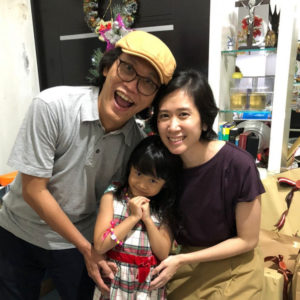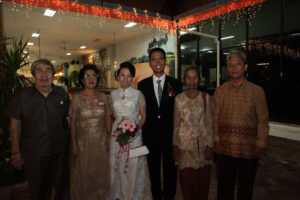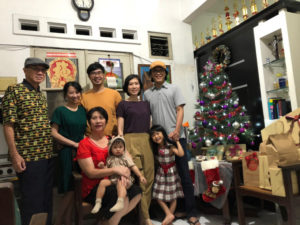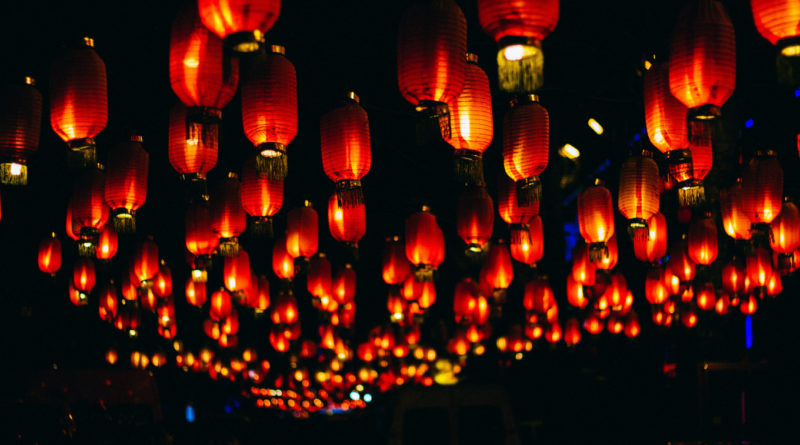ART & CULTURE: JAKARTA, Indonesia- Marrying into Chinese-Indonesian families: Stories of interethnic relationships
Lunar celebration: Lanterns are on display for Lunar New Year. (Unsplash/Elvir K) (Unsplash/Elvir K)

Marrying into a Chinese-Indonesian family can be like being initiated into a unique cultural tradition. However, it can also lead to a relationship fraught with historical trauma.
.
There’s only one thing Yuka Dian Narendra dreads about this year’s Lunar New Year festivities. “My cholesterol levels are through the roof now,” the 49-year old academic complained. “So, I have to be careful. But if some tried-and-true dishes make an appearance on the dinner table, I don’t know what I would do!”
.
SPACE RESERVE FOR ADVERTISEMENT
.
These days, everyday life seems idyllic for the academic/musician. Yuka is happily married and raising a beautiful 5-year-old daughter. He speaks with an enviable lightness about his family’s Lunar New Year plans, calling it an occasion for “being happy and nursing a full tummy”. But Yuka has worked harder than most to earn that contentment.
.
Born to parents from East Java and Madura Island in Central Java, Yuka has been married to Evelyn, who is of Chinese descent, for 11 years.

Happy days: Yuka Dian Narenda (left) with his wife and daughter. (Courtesy of Yuka Dian Narendra) (Personal Collection/Courtesy of Yuka Dian Narendra)
.
SPACE RESERVE FOR ADVERTISEMENT
.
Their interethnic relationship makes them stand out from most Indonesian couples.
.
A 2020 study by Statistics Indonesia (BPS) showed that 89.3% of Indonesians choose to marry someone from the same ethnic group. And a tangled web of historical, social and political trauma means that even fewer still of these interethnic marriages involve a Chinese-Indonesian spouse.
.
SPACE RESERVE FOR ADVERTISEMENT
.
For people like Yuka, Lunar New Year isn’t simply an occasion for fireworks and food. It’s a milestone in their own long, complex story of cultural encounters, negotiations, and barely concealed tension. Family matters “I have to admit, I didn’t fall in love with her at first sight,” said Widodo.
.
“That love was something we worked on together.” He met his now-wife, Ivana, when they were university students in Semarang, Central Java, and they quickly settled into blossoming, long-term relationship. It was stable, it seemed serious and both were stubbornly present for one another – even after Widodo graduated university and moved back to Jakarta in search of work. There was just one hitch: She is Chinese-Indonesian, he is Javanese. Having moved to Jakarta as a boy and attended a boarding school “full of Chinese-Indonesian students”, Widodo was familiar with Chinese-Indonesian culture and traditions.
.
“But being friends with Chinese-Indonesians and dating one was different,” he said. “This was special, and I had to be understanding about what her family wanted.” What her family wanted, however, was for the relationship to end. “At one point, the relationship was hopeless,” the 42-year-old office worker said. “Her mother told us point-blank that if we continued with this relationship, she would be cast out from her family.” Finally united: Widodo dated Ivana for almost a decade, but her parents only approved of their relationship in the last two years of their courtship.

Marrying her was the culmination of an arduous personal journey. (Courtesy of Widodo) (Personal Collection/Courtesy of Widodo)
SPACE RESERVE FOR ADVERTISEMENT
.
The disapproval, delivered so vehemently, may shock most, but according to Jony Eko Yuliyanto, an academic whose doctoral research focuses on interethnic marriages in Indonesia, it has deep roots in Indonesia’s complicated history of ethnic violence and national politics. “Ever since the first Chinese settlers came to the Indonesian archipelago in the 14th century, they have intermarried with the indigenous people,” he said. However, as colonization strengthened its grip on the archipelago, the government imposed a strict tiered social class with Europeans at the top, so-called indigenous peoples at the bottom and the Chinese settlers perched precariously in the middle.
.
SPACE RESERVE FOR ADVERTISEMENT
.
“The Chinese-Indonesians worked mostly as traders, and the colonial government used them as tax farmers and mediators for tax disputes,” Jony said. As economic tensions boiled over, the Chinese settlers often bore the brunt of the indigenous peoples’ anger.
.
This precipitated a worrying pattern of Chinese-Indonesians becoming eternal scapegoats for the elite’s oppression and failures – a theme that was repeated during the anticommunist purge of 1965/66 – Chinese-Indonesians were suspected of harboring sympathies for the communist government in mainland China – and, most famously, during the violent riots of 1998.
.
“This created the collective memory that most of the violence perpetrated against Chinese-Indonesians were initiated by the so-called pribumi [indigenous people],” Jony said. “Even though Chinese-Indonesians have been here for hundreds of years, they are still treated as eternal newcomers.”
.
SPACE RESERVE FOR ADVERTISEMENT
.
Marrying a non-Chinese-Indonesian was considered a betrayal of the centuries of violence and misdirected hate perpetrated against their community. “The sense was that this community is small, so you should marry your own to preserve your culture, thoughts and way of life,” Jony explained. “It’s as if there’s a fear of cultural erasure, even though their culture is simply articulated differently, not gone.”
.
For years, this tension was evident in Widodo’s relationship with Ivana. “What parents want their children to marry someone from a different ethnicity?” Widodo said, roughly recreating his tense initial discussions with his partner’s family. “Ivana repeatedly defended our relationship, but this process took us a long time.” Ivana’s family began to warm up to him when she moved to Jakarta to seek work herself, and Widodo helped her settle in by finding her a stable, respectable job.
.
But approval – the one thing they needed to pursue marriage – was still elusive. His patience was wearing thin, and Widodo insisted on seeing her parents once again in a final, desperate attempt to convince them to give them their blessing. “She [Ivana] told me, ‘Alright, you stay put, let me talk to them’,” he recalled. “Her family spoke Mandarin at home, and I remember she approached them in Mandarin. In the end, I was shocked. Her mother finally approved of our relationship.” Even after all these years, Widodo’s delight and disbelief remains palpable. The family’s approval finally gave them the opportunity to seriously consider a life together, and it was a possibility they relished. They have been married for over a decade now, and are raising two sons together. “We dated for almost a decade,” Widodo said. “And I only got the green light to go further in the last two or three years of our relationship!”
.
SPACE RESERVE FOR ADVERTISEMENT
.
Compromises According to Jony, interethnic marriages work when the couple turns the relationship into “a hybrid space where new things are possible for both of them, cultural practices can be negotiated and deep-seated ethnic tensions can be navigated”. It’s an experience that rings true for Yuka, whose own journey encompasses a convoluted but scenic engagement process. “We were so excited and ready to embrace what’s in front of us, so we took things for granted,” he said. “And in this case, that was good. We didn’t waste time questioning why this ritual is necessary in your culture or what’s the point of that ritual in my culture. We just went on with it.” Their extended families negotiated on whether certain steps in the engagement would be done in the Chinese or Javanese tradition.
.
But as their families busied themselves over the details, Yuka and his bride-to-be chose to simplify matters. “If a ritual exists in the Javanese tradition but does not exist in the Chinese tradition, we do it. And vice versa,” he said. “And if a ritual exists in both Chinese and Javanese culture, we discuss who takes the lead.” Compromises were reached quickly. The proposal ceremony, for example, was Chinese, but Yuka’s bride-to-be was introduced to his extended family in the Javanese sungkeman ceremony.

Special time: Yuka Dian Narendra (far right) and his wife don’t want to overcomplicate their cultural celebrations. (Courtesy of Yuka Dian Narendra) (Personal Collection/Courtesy of Yuka Dian Narendra)
.
SPACE RESERVE FOR ADVERTISEMENT
.
“We did it all with joy,” Yuka recalled. “Even getting to this point was reason enough to celebrate. So why over-complicate things?” As the two families got to know each other better, something unexpected united them: food. “My mother-in-law gets excited by my mother’s cooking on Idul Fitri, and every Lunar New Year, she would send my mother cookies and food,” he said.
.
His in-laws’ specialty, culinary delights from her hometown in Singkawang, became perennial favorites on Lunar New Year. “Food became the most fun and fluid means for cultural diplomacy between our families,” Yuka said. Jony heard a similar story from a middle-aged couple in Nganjuk, East Java. Interviewing them for an academic paper, he followed the couple as they negotiated their Lunar New Year celebrations. “She’s Javanese, he’s Chinese,” Jony recalled. “He told her his family would always eat bak kut teh [meaty pork ribs simmered in broth] on Lunar New Year’s eve, and he wanted to continue this tradition.” The wife was reluctant, simply because money was tight and the ingredients needed were expensive. So, they compromised.
.
SPACE RESERVE FOR ADVERTISEMENT
.
“I went with them to the market and saw them haggle with the pork butcher,” Jony said. “Bak kut teh should be made with pork ribs, but because they had a tight budget, they settled on pork ears instead.” And when the wife concocted the stew, it tasted far from what her husband’s mother had made. “Of course it was modified, and the husband joked that this was Javanese bak kut teh,” Jony said. “But it was a romantic dish.
.
This was their story on a plate. This was them negotiating and adapting with each other. “And more importantly, the bak kut teh was delicious!” A time for reflection Widodo paused and reflected on all he and his wife had to overcome to get this far. There’s a strong sense of familial bond in his life these days, as he lives right next to his wife’s family compound in West Jakarta.
.
There also an unexpected yet well-earned sense of trust. “Sometimes she [mother-in-law] asks me for help instead of her children,” he said proudly. “I have to work hard to keep that trust.” Nothing puts this journey into perspective more than Lunar New Year. “I’m familiar with the celebrations from my youth, but I’m still excited,” he said. “When I was at school, I saw the celebrations as an outsider. This time, I’m part of them. I’m involved. I’m family.” That giddiness is also apparent in Yuka. “There’s a tradition that you have to wear new clothes on Lunar New Year,” he explained. “My wife’s more practical, but I’m excited about it!
.
SPACE RESERVE FOR ADVERTISEMENT
.
I start to open guidebooks and websites and tell her, in the Chinese Zodiac, we are the Rat. So, according to this horoscope, we should buy these clothes instead!” “I’m the one who’s more fussy about this now,” he said, laughing. “Maybe it’s something that anyone who just embraces a new identity will go through.
.
There’s a desire for authenticity.” He wants to keep this excitement and pride for his daughter. “I want her to know both sides of her cultural legacy, that she has a Chinese mother and a Javanese-Madurese father,” Yuka concluded. “I hope she’s happy with her legacy, and she carries it with joy, too.”
Share Raka Ibrahim
The Jakarta Post) Denpasar ●
Mon, January 31, 2022
_______________________________________________________________________

Ads by: Memento Maxima Digital Marketing
@[email protected]
SPACE RESERVE FOR ADVERTISEMENT
_______________________________________________________________
This article was published in thejakartapost.com with the title “Marrying into Chinese-Indonesian families: Stories of interethnic relationships”.
Click to read: https://www.thejakartapost.com/culture/2022/01/30/marrying-into-chinese-indonesian-families-stories-of-interethnic-relationships.html.










